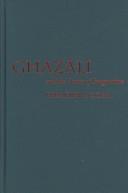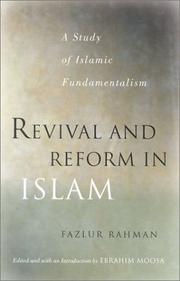| Listing 1 - 10 of 14 | << page >> |
Sort by
|
Book
ISBN: 9781474401739 9781474401746 Year: 2015 Publisher: Edinburgh : Edinburgh University Press,
Abstract | Keywords | Export | Availability | Bookmark
 Loading...
Loading...Choose an application
- Reference Manager
- EndNote
- RefWorks (Direct export to RefWorks)
Madrasahs --- Islamic education --- Islamic religious education --- Madrasa --- Education islamique --- Education religieuse islamique --- Madrasahs.

ISBN: 0807876453 9780807876459 0807829528 9780807829523 0807856126 9780807856123 9798890879233 Year: 2005 Publisher: Chapel Hill, NC University of North Carolina Press
Abstract | Keywords | Export | Availability | Bookmark
 Loading...
Loading...Choose an application
- Reference Manager
- EndNote
- RefWorks (Direct export to RefWorks)
Focusing on Abu Hamid al-Ghazali, the preeminent Muslim thinker, this book argues that his work has lasting relevance as a model for a critical encounter with Muslim intellectual tradition in a modern and postmodern context. It proposes that Muslims who place their own traditions in conversation with modern traditions share the same vantage point.
Creative ability. --- Ghazzali. --- Imagination. --- Philosophy, Islamic. --- Philosophy. --- Islamic philosophy --- Imagination --- Creative ability --- Philosophy --- Philosophy & Religion --- Creativeness --- Creativity --- Ability --- Creation (Literary, artistic, etc.) --- Arabic philosophy --- Muslim philosophy --- Philosophy, Islamic --- Philosophy, Arab --- Religious aspects --- Islam --- Imagery, Mental --- Images, Mental --- Mental imagery --- Mental images --- Educational psychology --- Intellect --- Psychology --- Reproduction (Psychology) --- Religious aspects&delete& --- Ghazzālī
Book
ISBN: 1474401767 1474401759 9781474401760 1474401740 9781474401746 1474401732 9781474401739 1469620138 9781469620138 9781474401753 9781474401753 1469620146 1469623331 9798890885869 Year: 2022 Publisher: Edinburgh
Abstract | Keywords | Export | Availability | Bookmark
 Loading...
Loading...Choose an application
- Reference Manager
- EndNote
- RefWorks (Direct export to RefWorks)
Explains the role of the madrasa in the cultural, intellectual and religious experience of MuslimsThe prospects for peace in Afghanistan, dialogue between Washington and Tehran, the UN’s bid to stabilise nuclear-armed Pakistan, understanding the largest Muslim minority in the world’s largest democracy in India, or the largest Muslim population in the world in Indonesia – all require some knowledge of the traditional religious sectors in these countries and of what connection traditional religious schooling has (or not) to their geopolitical situations.Moosa delves into the world of madrasa classrooms, scholars and texts, recounting the daily life and discipline of the inhabitants. He shows that madrasa are a living, changing entity, and the site of contestation between groups with varying agendas, goals and notions of modernity.Reading this unique and engaging introduction will provide readers with a clear grasp of the history, place and function of the madrasa in today’s Muslim world (religious, cultural and political). It will also investigate the ambiguity underlying the charge that the madrasa is at heart a geopolitical institution.Key Features:Structured clearly around the role and function of the madrasa in the past and the presentInfuses history, tradition and everyday practice with concrete examples of how the institutions functionProvides a view of the madrasa from within – the author studied in leading Indian madrasas for 6 yearsTreats madrasas worldwide, with a special focus on those in South AsiaIncludes a glossary of key non-English terms used in the book
Madrasahs. --- Islamic education. --- Islamic religious education. --- Muslim religious education --- Religious education, Islamic --- Islamic education --- Religious education --- Education, Islamic --- Education, Muslim --- Islam --- Muslim education --- Education --- Madrasas --- Madrasehs --- Madrassahs --- Madrassas --- Medreses --- Medressehs --- Islamic religious education --- Schools --- Muslims

ISBN: 9781851682041 185168204X Year: 2000 Publisher: Oxford : Oneworld,
Abstract | Keywords | Export | Availability | Bookmark
 Loading...
Loading...Choose an application
- Reference Manager
- EndNote
- RefWorks (Direct export to RefWorks)
Book
ISBN: 0226702863 9780226702865 Year: 2009 Publisher: Chicago The university of Chicago press
Abstract | Keywords | Export | Availability | Bookmark
 Loading...
Loading...Choose an application
- Reference Manager
- EndNote
- RefWorks (Direct export to RefWorks)
Book
ISBN: 9780415780858 9780415780865 9780203736340 9781135007959 9781135007935 9781135007942 0203736346 0415780861 0415780853 Year: 2013 Publisher: London Routledge
Abstract | Keywords | Export | Availability | Bookmark
 Loading...
Loading...Choose an application
- Reference Manager
- EndNote
- RefWorks (Direct export to RefWorks)
Islam --- 297 "20" --- Islam. Mohammedanisme--21e eeuw. Periode 2000-2099 --- Islam - 21st century --- Islam - 20th century
Book
ISBN: 9780268108373 9780268108403 9780268108397 Year: 2021 Publisher: Notre Dame, Ind. University of Notre Dame Press
Abstract | Keywords | Export | Availability | Bookmark
 Loading...
Loading...Choose an application
- Reference Manager
- EndNote
- RefWorks (Direct export to RefWorks)
297.15 --- 297.15 Islam: ethiek; religieuze wetten --- Islam: ethiek; religieuze wetten --- Professional ethics. Deontology --- Islam
Book
ISBN: 0268108390 0268108404 0268108374 9780268108403 9780268108373 Year: 2021 Publisher: Notre Dame University of Notre Dame Press
Abstract | Keywords | Export | Availability | Bookmark
 Loading...
Loading...Choose an application
- Reference Manager
- EndNote
- RefWorks (Direct export to RefWorks)
"Padela and his contributors address a hitherto unexplored dimension of Islamic bioethics: the dynamics and tensions between Muslim medical doctors and Islamic jurists. What happens, and what should happen, when ancient faith and modern medicine both make claims on care for the ill? What, at the end of the day, constitutes true 'Islamic bioethics?' Includes a foreword and a chapter by Ebrahim Moosa"--
Medical laws and legislation (Islamic law) --- Bioethics --- Religious aspects --- Islam.
Book
ISBN: 128263416X 9786612634161 9048511321 9789048511327 9789089641724 9089641726 9781282634169 Year: 2010 Publisher: Amsterdam Amsterdam University Press
Abstract | Keywords | Export | Availability | Bookmark
 Loading...
Loading...Choose an application
- Reference Manager
- EndNote
- RefWorks (Direct export to RefWorks)
Offers comparative historical, anthropological and legal perspectives on the ways in which French and British colonial administrations interacted with the diversity of Islamic legal schools, scholars, and practices in Africa.
Colonies --- Colonial administration --- Public administration --- Administration. --- Africa --- Colonization. --- Domestic relations (Islamic law) --- Familles --- Droit islamique --- Africa, Sub-Saharan --- Afrique subsaharienne --- Administration
Book
ISBN: 9781626161993 1626161992 9781626161979 1626161976 9781626161986 1626161984 Year: 2015 Publisher: Washington, DC : Georgetown University Press,
Abstract | Keywords | Export | Availability | Bookmark
 Loading...
Loading...Choose an application
- Reference Manager
- EndNote
- RefWorks (Direct export to RefWorks)
The hope and despair surrounding the Afro-Arab Spring in North Africa has only begun to be played out in regional and global politics. And the call for an African renaissance that followed the miraculous political transition in South Africa is, twenty years later, viewed with similar ambiguity. What is clear is that current developments in Africa, north and south, promise something markedly different from what has prevailed at any point since the dawn of the African independence movements of the 1950s and 60s. But the continent's own identity remains unresolved, posing the question whether and how its multiple and divergent experiences can be understood and perhaps woven into a basis for unity. Contributors to this volume explore whether or not events north of the Sahara and on the southern tip of Africa can be catalysts for change in other parts of the continent. Chapters assesses the nature of political resistance, revolution, and transition in North and Southern Africa, addressing critical factors--economics, culture, gender, theology--that reveal the promises and perils of African reform. Includes a foreword by former South African president Thabo Mbeki.
Arab Spring, 2010 --- -Printemps arabe, 2010 --- -Africa --- Afrique --- Politics and government --- Politique et gouvernement
| Listing 1 - 10 of 14 | << page >> |
Sort by
|

 Search
Search Feedback
Feedback About UniCat
About UniCat  Help
Help News
News